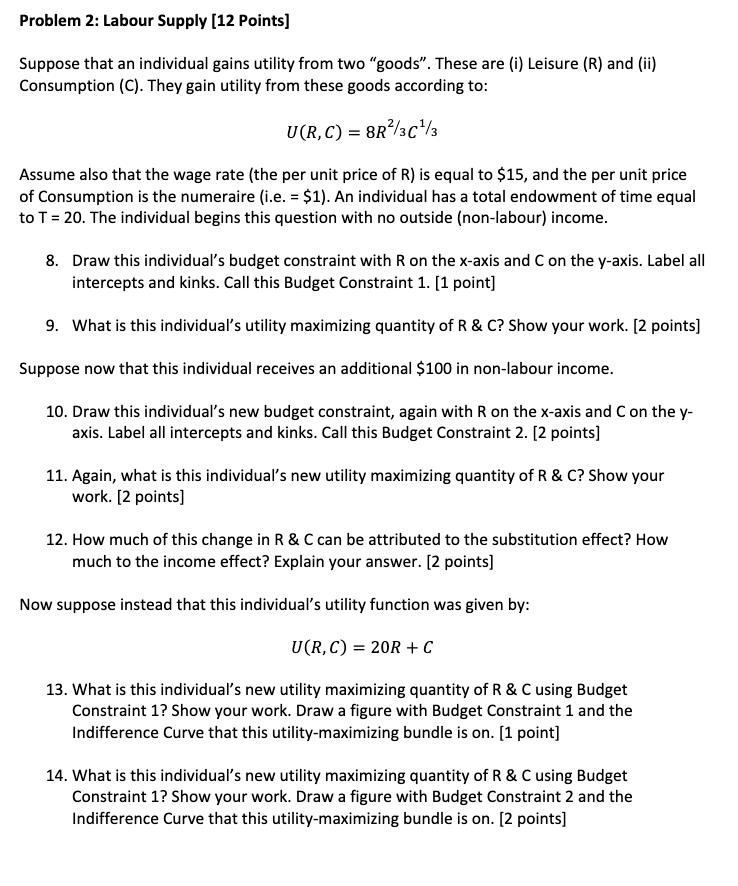
Suppose that an individual gains utility from two "goods". These are (i) Leisure (R) and (ii) Consumption (C). They gain utility from these goods according to: U(R,C)=8R2/3C1/3 Assume also that the wage rate (the per unit price of R ) is equal to $15, and the per unit price of Consumption is the numeraire (i.e. =$1 ). An individual has a total endowment of time equal to T=20. The individual begins this question with no outside (non-labour) income. 8. Draw this individual's budget constraint with R on the x-axis and C on the y-axis. Label all intercepts and kinks. Call this Budget Constraint 1. [1 point] 9. What is this individual's utility maximizing quantity of R \& C? Show your work. [2 points] Suppose now that this individual receives an additional \$100 in non-labour income. 10. Draw this individual's new budget constraint, again with R on the x-axis and C on the y axis. Label all intercepts and kinks. Call this Budget Constraint 2. [2 points] 11. Again, what is this individual's new utility maximizing quantity of R&C ? Show your work. [2 points] 12. How much of this change in R&C can be attributed to the substitution effect? How much to the income effect? Explain your answer. [2 points] Now suppose instead that this individual's utility function was given by: U(R,C)=20R+C 13. What is this individual's new utility maximizing quantity of R&C using Budget Constraint 1 ? Show your work. Draw a figure with Budget Constraint 1 and the Indifference Curve that this utility-maximizing bundle is on. [1 point] 14. What is this individual's new utility maximizing quantity of R&C using Budget Constraint 1? Show your work. Draw a figure with Budget Constraint 2 and the Indifference Curve that this utility-maximizing bundle is on. [2 points] Suppose that an individual gains utility from two "goods". These are (i) Leisure (R) and (ii) Consumption (C). They gain utility from these goods according to: U(R,C)=8R2/3C1/3 Assume also that the wage rate (the per unit price of R ) is equal to $15, and the per unit price of Consumption is the numeraire (i.e. =$1 ). An individual has a total endowment of time equal to T=20. The individual begins this question with no outside (non-labour) income. 8. Draw this individual's budget constraint with R on the x-axis and C on the y-axis. Label all intercepts and kinks. Call this Budget Constraint 1. [1 point] 9. What is this individual's utility maximizing quantity of R \& C? Show your work. [2 points] Suppose now that this individual receives an additional \$100 in non-labour income. 10. Draw this individual's new budget constraint, again with R on the x-axis and C on the y axis. Label all intercepts and kinks. Call this Budget Constraint 2. [2 points] 11. Again, what is this individual's new utility maximizing quantity of R&C ? Show your work. [2 points] 12. How much of this change in R&C can be attributed to the substitution effect? How much to the income effect? Explain your answer. [2 points] Now suppose instead that this individual's utility function was given by: U(R,C)=20R+C 13. What is this individual's new utility maximizing quantity of R&C using Budget Constraint 1 ? Show your work. Draw a figure with Budget Constraint 1 and the Indifference Curve that this utility-maximizing bundle is on. [1 point] 14. What is this individual's new utility maximizing quantity of R&C using Budget Constraint 1? Show your work. Draw a figure with Budget Constraint 2 and the Indifference Curve that this utility-maximizing bundle is on. [2 points]







